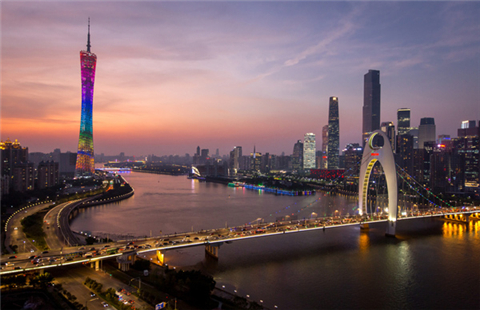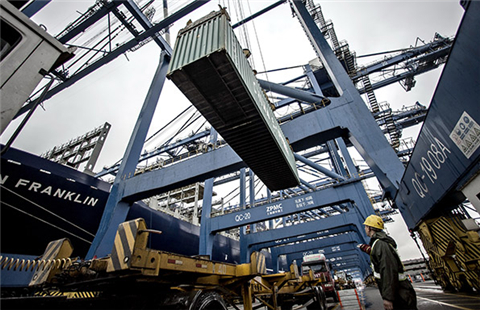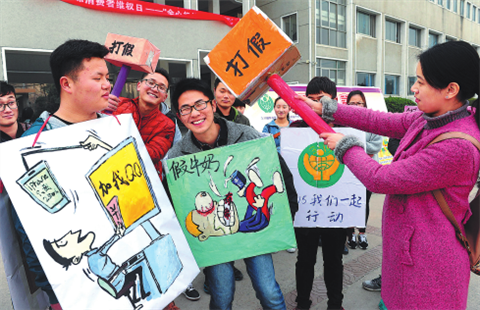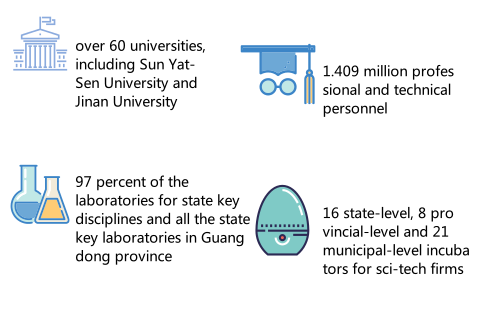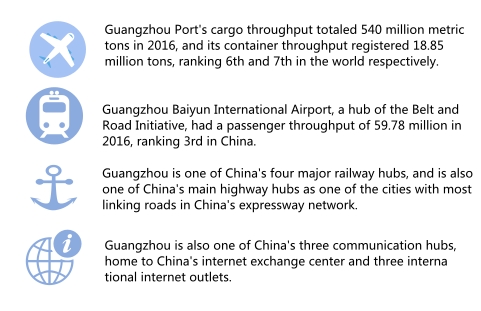Foxconn to build world-giant plant
Sakai Display Products Corp, a subsidiary of the world's largest electronics contractor Foxconn Technology Group, began construction of the world's largest 8k-resolution panel factory in Guangzhou, capital of Guangdong province, on Wednesday.
The factory, with an investment of 61 billion yuan ($8.86 billion), will mainly produce the 10.5 generation panel, substrate glass and related product lines, and serve as a major supplier for Japanese TV set maker Sharp Corp, according to the company.
Guangzhou sees new development opportunities
Guangzhou - STV Sakai (Guangzhou) International Science and Technology, a subsidiary of the world's largest electronics contractor Foxconn Technology Group, has formally completed registration in China's southern Guangdong Province, according to local customs.
STV Sakai, with a registered capital of 21 billion yuan ($3 billion), plans to invest 50 billion yuan to produce the 10.5 generation panel, substrate glass and related product lines.
Multinational companies drawn to knowledge center
Last year saw major investment projects funded by Fortune Global 500 companies in Guangzhou, such as Cisco (Guangzhou) Smart City, the southern headquarters of China Railway Construction Corp Ltd and COSCO Shipping Bulk Co Ltd.
The Cisco project, signed in April, will also serve as Cisco's head office of innovation center in China. Focusing on innovation related to the internet of everything and the internet of things, and working with global partners, the project is expected to generate 100 billion yuan ($15 billion) in annual output.
Guangdong sees robust growth of high-tech firms
GUANGZHOU - South China's Guangdong province saw robust growth of high-tech firms last year with heavy investment during a national innovation drive.
The number of high-tech companies in Guangdong's Pearl River Delta region, a manufacturing center, reached 18,880 in 2016, up 78.8 percent over 2015, according to data released at a provincial innovative development conference held Tuesday.
Government investment in science and technology in the delta region soared 88 percent.
Guangzhou reduces costs for businesses by 70b yuan in 2016
A group of 33 online media journalists and experts arrived in Guangzhou on Jan 7 to take part in a government-organized promotion activity showcasing Guangdong province's progress in promoting supply-side economic reform.
This was the last leg of the "Economic Vitality in Guangdong, Supply-side Structural Reform" media promotion tour, which began on Jan 4 and included stops in the cities of Foshan, Zhongshan and Jiangmen, as well as the provincial capital.
Jointly sponsored by the Publicity Department of Guangdong, Office of the Central Leading Group for Cyberspace Affairs of Guangdong, and Development and Reform Commission of Guangdong, the activity has generated hot discussions since it began.
Guangzhou targets intellectual property protection
Poised to become an innovative smart city, Guangzhou, capital of Guangdong province, has beefed up its investment incentives for intellectual property protection.
In the latest implementation plan published through the executive meeting of Guangzhou government in last December, the city committed itself to becoming an intellectual property hub. It will focus on highlighting innovation, translating knowledge into application, completing a protection mechanism, creating a sound service system and becoming a place for high-level talents.
The plan highlights four major tasks, including the deepening of reform in the intellectual property management system and mechanism, implementing strict protection of intellectual property, supporting the creation and application of core intellectual property rights, and establishing bases for talents.
Guangzhou focuses on innovation
Guangzhou, capital of Guangdong province, will push forward development of a national innovation center within the next five years by introducing more high-tech and innovative businesses, according to the city's newly elected mayor.
"We will develop more new high-tech and innovative businesses in the years ahead as self-dependent innovation plays an increasing role in economic transformation and industrial upgrading," said Wen Guohui, 53, who was elected mayor of Guangzhou after the conclusion of the Guangzhou people's congress on Tuesday.
According to Wen, the city will develop 8,000 new high-tech companies and 200,000 innovative enterprises for science and technology by 2020.
Human resources
Guangzhou has 107 secondary vocational schools, more than 10 colleges for adults and over 60 universities, including Sun Yat-Sen University, Jinan University, South China Agricultural University, the Guangdong University of Technology, Guangzhou University and the Guangdong University of Foreign Studies.
The city has cooperated with more than 200 research institutes from about 20 countries and regions. It is home to two thirds of higher educational institutions, 97 percent of the laboratories for state key disciplines and all the state key laboratories in Guangdong province. About 2.88 million people have an educational background above college level. There are 1.409 million professional and technical personnel and 2.122 million skilled people. Six Noble Prize winners, 77 academicians of the Chinese Academy of Sciences and the Chinese Academy of Engineering, 129 entries of the "1000 Talent Plan"(a Chinese government-initiated global talent program), 139,500 people with senior professional and technical qualifications and 642,000 highly skilled talents worked in Guangzhou in 2015.
Guangzhou green lights foreign experts
For the fourth consecutive year, Guangzhou has won the title of most popular city among foreigners, sending out 1,220 green cards in 2016 to attract foreign talents, the Guangzhou Municipal Human Resources and Social Security Bureau announced in a meeting on Feb 23.
Guangzhou witnessed an influx of high-level talents in 2016. Sixteen experts have been successfully recommended to receive special government allowances from the State Council, nine innovation bases have been set up for post-doctors and 15 High-End Foreign Experts Projects have been launched.
The city has received huge attention for its move to green light a total of 1,220 foreign experts to build a smart city.
Guangzhou to improve public transport system
Guangzhou has unveiled plans for another big construction project to improve the city's public transport system in the city's 13th Five-Year Plan (2016-20) for urban infrastructure development published on Feb 1.
The plan's main objective is for Guangzhou to connect all its transport networks into one integrated system by 2020, including its airports, railways, highways, metros, ports and green transport. This should make travelling around the city quicker and more convenient for visitors and residents.
There are also ambitions for Guangzhou to create an "Air Silk Road", which could lead to a large increase in the number of flight connections from local airports. By 2020, the city hopes to have created a "four-hour traffic circle" connecting Guangzhou with other major cities in China and Southeast Asia. Guangzhou also intends to construct a "twelve-hour traffic circle" linking to metropolises all over the world.
Ready for innovators
In two UN released reports, The World Urbanization Prospects and China Sustainable Cities Report 2016: Measuring Ecological Input and Human Development, Guangzhou was recognized as an ultra-large city with the fastest development in the world, topping the Human Development Index among Chinese cities. Guangzhou also ranked first in Chinese Cities of Opportunity 2016 jointly released by Price Waterhouse Coopers Consulting (PwC) and the China Development Research Foundation.
In addition to an "agreeable living environment" and "powerful industrial base", Guangzhou also boasts unique investment and business advantages.

